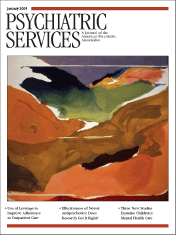Consumer Views of Representative Payee Use of Disability Funds to Leverage Treatment Adherence
Abstract
OBJECTIVE: Although representative payee arrangements are common among people with psychiatric disabilities, only a small body of research has investigated how consumers feel about representative payees' use of disability funds to attempt to improve treatment adherence. METHODS: Consumers who were in treatment for a recently documented diagnosis of schizophrenia or a related disorder (N=104) were interviewed to assess their perceptions of the use of disability funds and other legal pressures to attempt to improve treatment adherence. RESULTS: Most consumers in the sample (65 percent) did not agree that withholding money was a useful method to improve treatment adherence. Multivariate analyses indicated that participants were more likely to agree that use of money as leverage was helpful if they also felt that other legal pressures were helpful for improving adherence and if they felt free to do as they wanted regarding their mental health treatment. On the other hand, participants were less likely to endorse the benefits of money used as leverage if they had at least a high school education and if they reported abusing substances in the past month. CONCLUSIONS: The results of this study point to factors that mediate the potentially negative effects of perceived coercion that are sometimes associated with representative payee arrangements. Leverage of disability funds will likely have an optimal effect if combined with efforts to enhance a sense of self-determination. Conversely, consumers with more education may be less open to this practice, possibly because of perceived stigma related to not being able to control their own finances.



